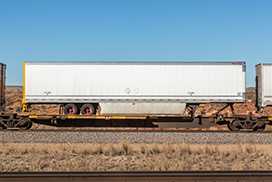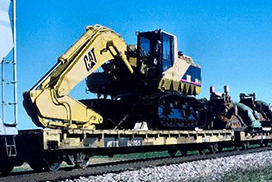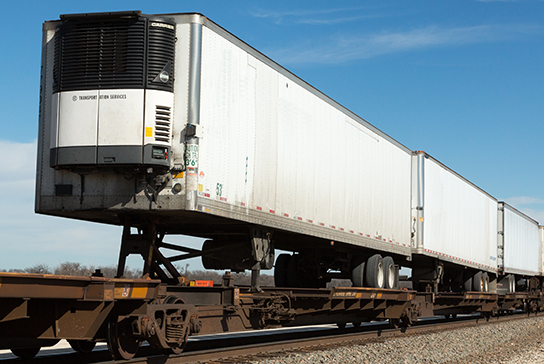Containers

A container is a weatherproof box designed for bulk shipment of freight. Domestic containers come in 45 feet, 48 feet and 53 feet-long options. Ocean containers come in 20 feet and 40 feet-long options. They are designed for all modes of intermodal transport.
Trailers

A trailer is a weatherproof box with permanent wheels designed for bulk shipment of freight on rail, highway or combination of both. Trailers come in 45 feet, 48 feet and 53 feet-long options.
Temperature-Controlled Trailers
A temperature-controlled trailer is a weatherproof box with permanent wheels designed for perishable shipment of freight on rail, highway or combination of both. Trailers come in 45 feet, 48 feet and 53 feet-long options.
Intermodal Railcar
The most common intermodal container railcars that BNSF uses in intermodal transportation are shown below.

3 Well Double-Stack Car (There are also one and five well railcars)

Conventional Intermodal Car
Oversize and Non-Standard Intermodal Equipment

An intermodal shipment greater than 8’6 wide and 13’6 high is considered Dimensional or Non-Standard Equipment. In general, with proper information and approvals (defined below), BNSF can handle shipments up to 11’ wide and 15’ high.
Any shipment greater than 11’ wide and 15’ high (17’ above top of rail) must follow the Carload Dimensional Process and move in manifest service (not to/from an Intermodal Hub).
Shipment Information
Complete the form on your
Dimensional or Non-Standard Equipment shipment.
Obtain Special Price Authority
Once approvals are received, your marketing representative will provide an Intermodal Special Price Authority.
Shipping Instructions
When submitting the Shipping Instructions, state the shipment is Dimensional or Non-Standard Equipment, special price authority, actual commodity description (along with all the required elements as stated in the BNSF Intermodal Rules and Policies Guide, Item 7: Shipping Instructions).
Tendering Shipment
When tendering an Oversized shipment, it will be placed on Hold (LSHold) for Mechanical and Clearance Inspections. Inspections may take up to 2-3 business days.
Contacts
Don't own your own equipment?
BNSF has partners with intermodal carriers to provide containers or trailers if you do not own your own equipment. In addition to providing equipment, these carriers can assist with moving individual or multiple shipments, including interline traffic and complete door-to-door movement by arranging equipment, waybilling (shipping instructions), draying, tracing, etc. For more information, contact a BNSF sales representative.
If you do own your own equipment, please review the information below:
Loading and Shipment Safety
Loading assistance and information.
Intermodal Loading Guide
Guidelines to properly load contents into equipment for intermodal transportation.
Demurrage and Storage
Intermodal storage.
Prohibited Hazardous Commodities
Prohibited commodities in some equipment.
Neutral Chassis Pools
At various intermodal facilities, Neutral Chassis Pools are available for your use. See the table below for BNSF locations and pool operator contact information. To utilize Neutral Pool Chassis, a Chassis Use Agreement with the pool operator is required. Equipment rental charges are the responsibility of the user. Twenty (20'), forty (40'), and forty-five (45') foot chassis are available.
At some locations, the chassis may be returned to another city or to another
railroad's intermodal facility within the same city.
* Private chassis may not be staged at these locations.
Advanced Lift and Ride Technology
BNSF has invested in the latest technology to minimize equipment damage. This advanced lift technology features:
-
Wider and longer shoes
-
Ultra sensors to detect roof damage
The benefits of this technology include:
-
Virtually eliminated roof damage
-
Faster lift on/lift off with error-free lifting
BNSF uses a manufacturer-approved, patented wedge device that prevents the airbag from stretching during lift operations.
General Information
Your Guide To Going Intermodal
Learn which intermodal service option is best for your supply chain.
Intermodal Rules and Policies Guide
Intermodal Advisor
Find out how to lower your transportation costs.
Intermodal Customer Reference Guide
Describes how to ship an intermodal shipment.
Loading and Restricted Commodities
Outlines some Restricted Commodities and aspects of the Intermodal Rules and Policies Guide.
Customs Fees
Surcharges for Animal Plant Health Inspection Service (APHIS) and Consolidated Omnibus Budget Reconciliation Act (COBRA) inspects.
Port Fees
The following surcharges are applied on intermodal shipments traversing the Alameda Corridor or originating or terminating at the Port of Portland and Port of Tacoma.
BNSF may impose surcharges as stated in the BNSF Intermodal Rules and Policies Guide. All applicable intermodal shipments are subject to these charges, regardless of price authority (including contracts and agreements). Surcharges are applied to the freight bill based on the BNSF shipping instructions (waybill) date.
ACTA (Alameda Corridor Transportation Authority)
Alameda Corridor Transportation Authority Current Use Fees and Container Charges are applicable for shipments traversing the Alameda Corridor.
Port of Portland
Port of Portland Rail Carrier Intermodal Yard Facility Fee is stated in the Port of Portland Marine Terminal Item 8.
Port of Tacoma
Port of Tacoma Intermodal Facility Charges is stated in the Containers Section of the Port of Tacoma Tariff 300, Section 6.
Commodity Information
Prohibited Hazardous Commodities
Prohibited commodities in some equipment.
Bulk Agricultural Products
Procedures to ship bulk products via intermodal.
Coiled Metal Shipment Policies and Procedures
Procedures to ship coiled metal via intermodal.






